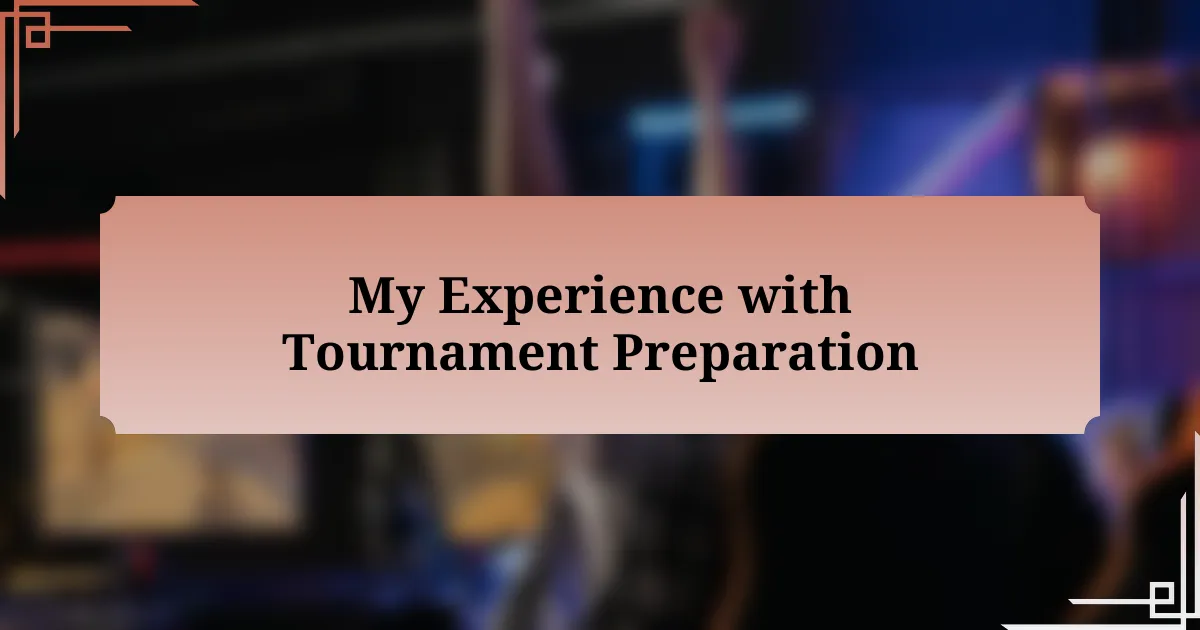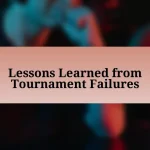Key takeaways:
- Tournament preparation involves skill development, understanding the game meta, and maintaining mental resilience.
- Effective strategies include creating a solid game plan, practicing under pressure, and using visualization techniques to boost confidence.
- Physical health and teamwork significantly influence performance; clear communication and health management are crucial during competitions.
- Analyzing opponents and adapting strategies based on game mechanics are essential for success in different competitive environments.
Author: Evelyn Hartley
Bio: Evelyn Hartley is an award-winning author known for her compelling narratives and richly drawn characters. With a background in psychology and literature, she weaves intricate tales that explore the complexities of human relationships and the intricacies of the human psyche. Her debut novel, “Whispers in the Dark,” was celebrated by critics and readers alike, earning her a dedicated following. Evelyn’s work has been featured in various literary journals and anthologies, and she frequently speaks at writing conferences and workshops. When she’s not writing, she enjoys hiking in the mountains and volunteering at her local animal shelter. She resides in Seattle with her two rescue dogs, Luna and Milo.
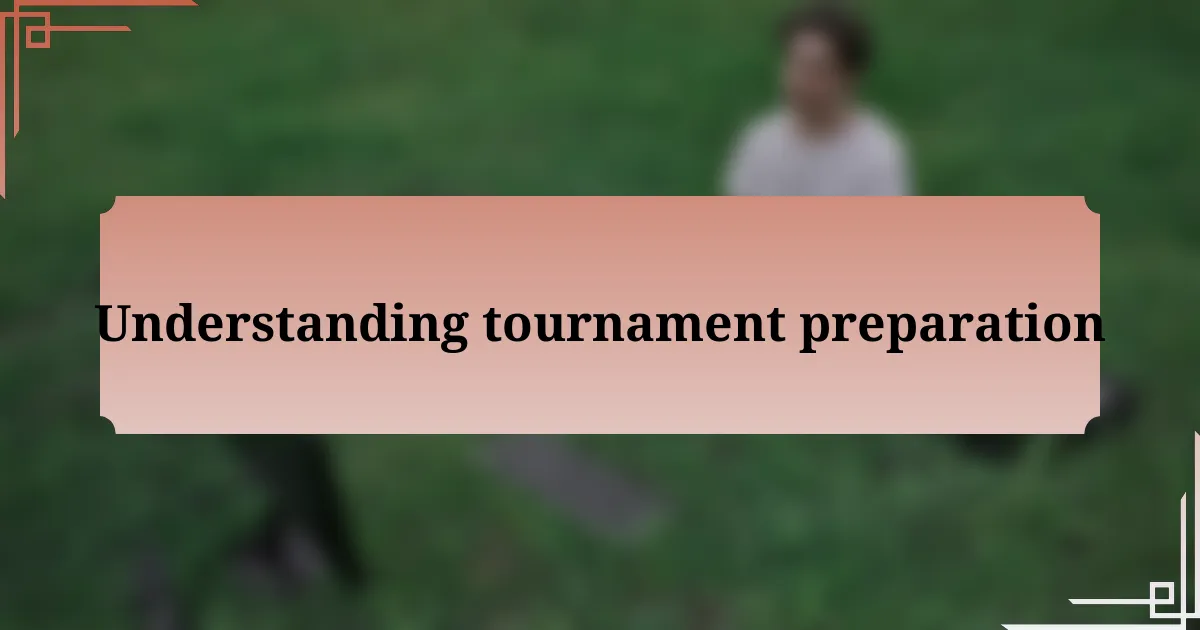
Understanding tournament preparation
Tournament preparation is a multifaceted process that goes beyond just honing your skills in the game. I remember the first time I participated in an eSports tournament; I was overwhelmed by the sheer amount of planning involved. How do you even begin to balance practice, strategy development, and mental preparation?
One of the most crucial elements of preparation is understanding the game meta, which refers to the most effective strategies available. During my preparation for a major tournament, I dedicated countless hours to analyzing not only my gameplay but also that of my opponents. Have you ever wondered how a slight change in strategy can shift the outcome of a match? I found that small adjustments based on research and observation made a significant impact on my performance.
Moreover, the psychological aspect of tournament preparation can’t be overlooked. It’s about building resilience and maintaining focus under pressure. I recall moments when self-doubt crept in during late-night practice sessions. How can you stay confident when the stakes are so high? I learned to embrace those emotions, using them as motivation to push myself further, ultimately transforming anxiety into a driving force for success.
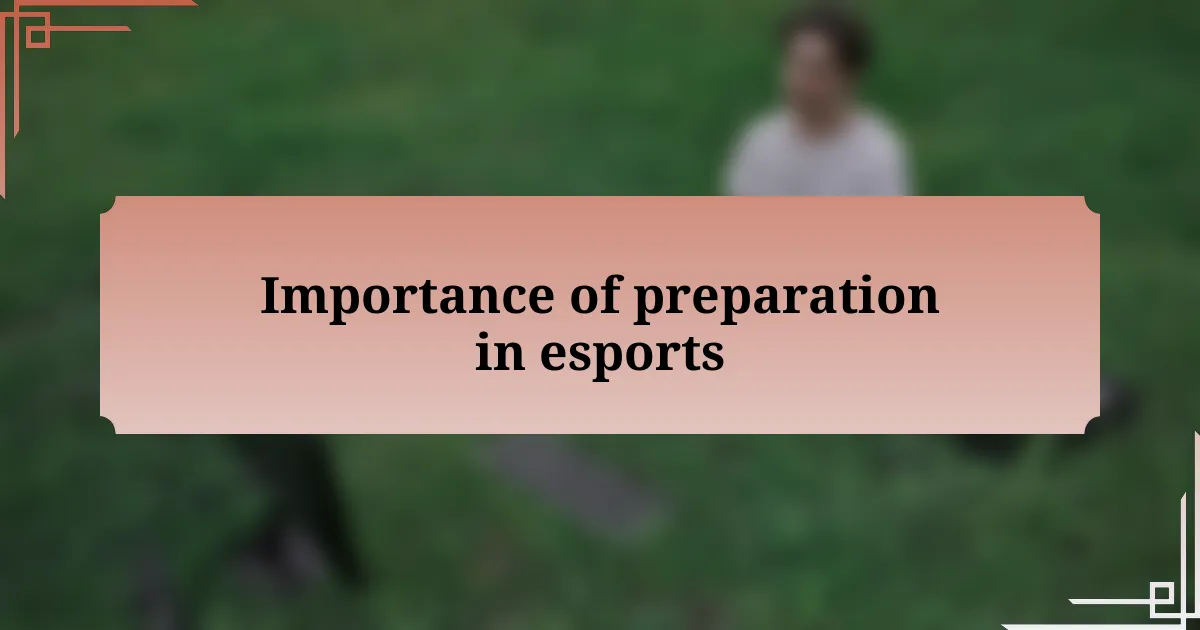
Importance of preparation in esports
The importance of preparation in esports cannot be understated. I vividly remember a tournament where my team and I faced a formidable opponent known for their unconventional strategies. We spent weeks analyzing their past matches, trying to anticipate their moves. The more prepared we were, the more confidence we gained, which directly translated into our gameplay. Isn’t it fascinating how knowledge can shift the dynamics of a match before it even begins?
In another instance, I experienced firsthand the impact of physical preparation. One evening, after a grueling practice session, I felt exhausted but knew I had to maintain my energy levels. So, I adjusted my diet and sleep schedule leading up to the tournament. The results were impressive; I was sharper, quicker in my decision-making, and overall more resilient during the matches. Isn’t it amazing how what we eat and how well we rest can change our performance?
Lastly, I’ve learned that team synergy is key. During a pivotal moment in a tournament, my team and I struggled to communicate effectively. In hindsight, we realized our lack of preparation for in-game communication led to missed opportunities. After that experience, we implemented strategies for clearer communication, which ultimately enhanced our teamwork. How could a single factor like communication have such a profound effect on the outcome of our games? It’s a lesson that continues to shape my approach to tournament prep.
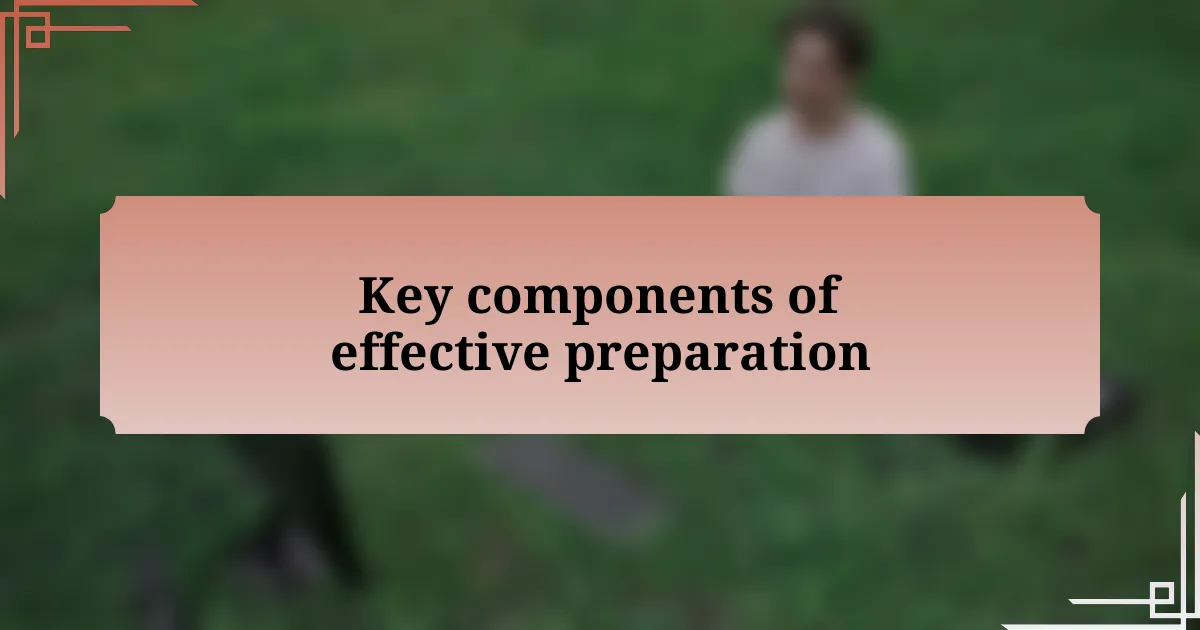
Key components of effective preparation
One vital component of effective preparation is developing a solid game plan. I recall a tournament where we crafted a thorough strategy based on our strengths and the weaknesses of our opponents. This involved not just mapping out tactics but also establishing roles within the team. Have you ever noticed how clarity in roles can enhance team performance? For us, it felt like everyone was contributing to a shared vision, making it easier to execute under pressure.
Another critical aspect is practicing under tournament-like conditions. I remember our team simulated high-stress scenarios, complete with time constraints and audience distractions. Initially, I found it challenging, and my nerves would creep in. However, over time, I learned that acclimating to such pressure made the actual competition feel more manageable. Isn’t it fascinating how the mind can adapt when pushed out of its comfort zone?
Lastly, mental preparation plays a huge role in my experience. There was a time I struggled with anxiety before a major game, feeling overwhelmed by expectations. To combat this, I started incorporating visualization techniques into my routine, imagining every play and possible outcome ahead of time. This practice not only calmed my nerves but also boosted my confidence. Don’t you think having a strong mental game can be just as crucial as technical skills?
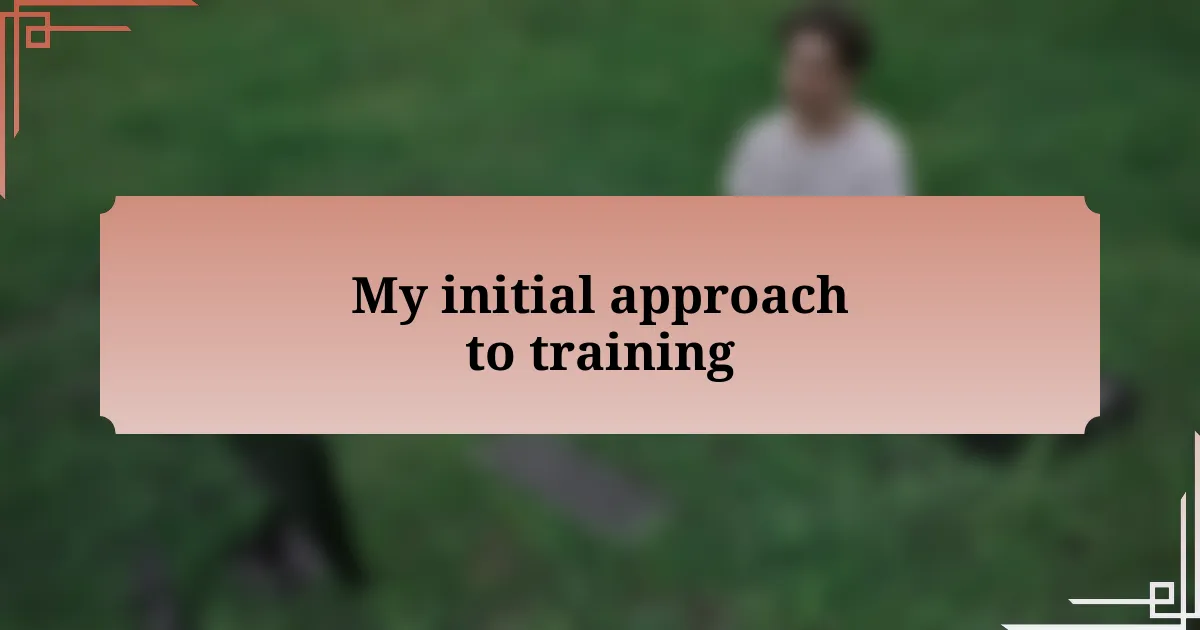
My initial approach to training
When I first dive into training for a tournament, my initial approach centers on setting specific, measurable goals. I recall one season where I decided to focus on improving my reflexes and reaction time. Each day, I dedicated an hour to drills that pushed my limits, and the progress felt exhilarating. Have you ever set a target that seemed impossible at first, only to crush it later?
Another fundamental step for me is dissecting my gameplay. I usually record my matches and analyze them to identify patterns or mistakes; this was eye-opening during a particularly tough competition. One match, I realized I was overcommitting in team fights, which often led to early eliminations. It’s interesting how self-reflection can turn a casual game into a learning experience, don’t you think?
Lastly, integrating physical fitness into my routine made a surprising difference. When I recognized that gaming performance isn’t solely about skills but also stamina, I started a workout regimen. At first, juggling physical training with gaming felt overwhelming, but soon I noticed increased focus and energy during long practice sessions. Isn’t it remarkable how enhancing one aspect of your life can uplift another?
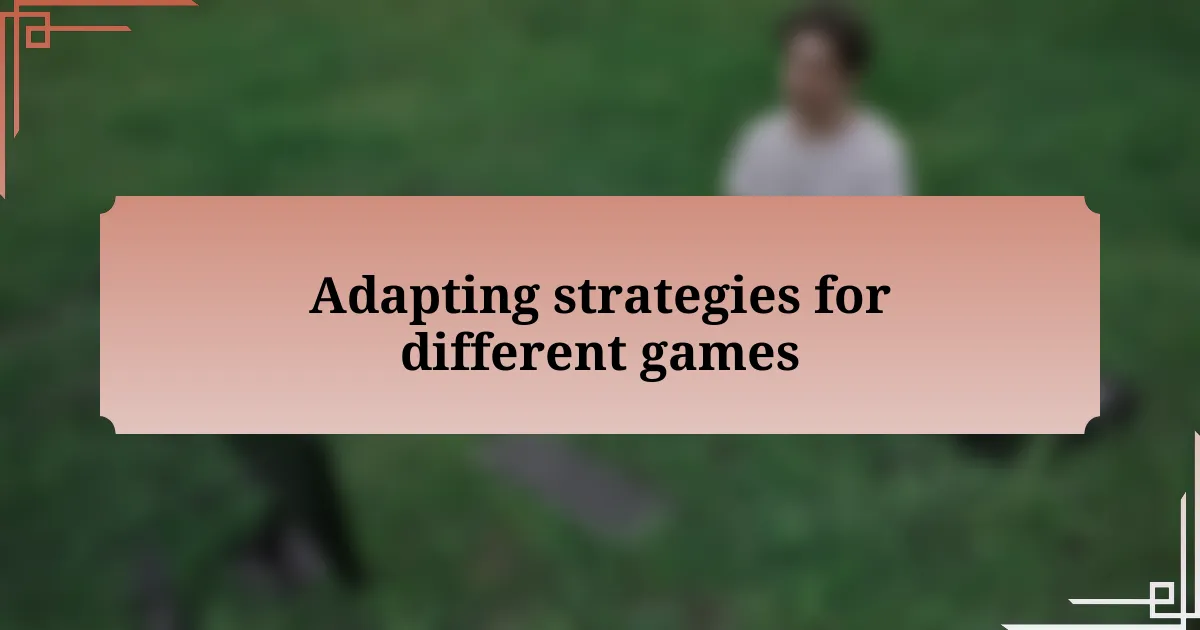
Adapting strategies for different games
Adapting strategies for different games requires a shift in mindset that I found crucial. For instance, I remember transitioning from a first-person shooter to a strategy game, which was a drastic change in approach. The pacing and decision-making processes were fundamentally different, and it took a few frustrating sessions to recalibrate my tactics. Have you ever felt the challenge of switching gears in your gameplay?
Each game has its own unique mechanics and meta, and I’ve learned to embrace this diversity. In my experience, understanding the nuances of each title I play is vital. For example, while playing a MOBA, communication and map awareness were essential, but in a battle royale, surviving and positioning became my top priorities. It’s astonishing how much variance there can be in what works best, isn’t it?
The adaptation process isn’t just about altering strategies but also about shifting how I view my role within different team dynamics. One memorable moment was during a tournament where I had to switch from a supportive role to a more aggressive playstyle midway through the competition. The initial anxiety was real, but once I embraced the change, I felt invigorated, pushing myself to take risks I hadn’t contemplated before. Isn’t it intriguing how flexibility in roles can unlock new potential?
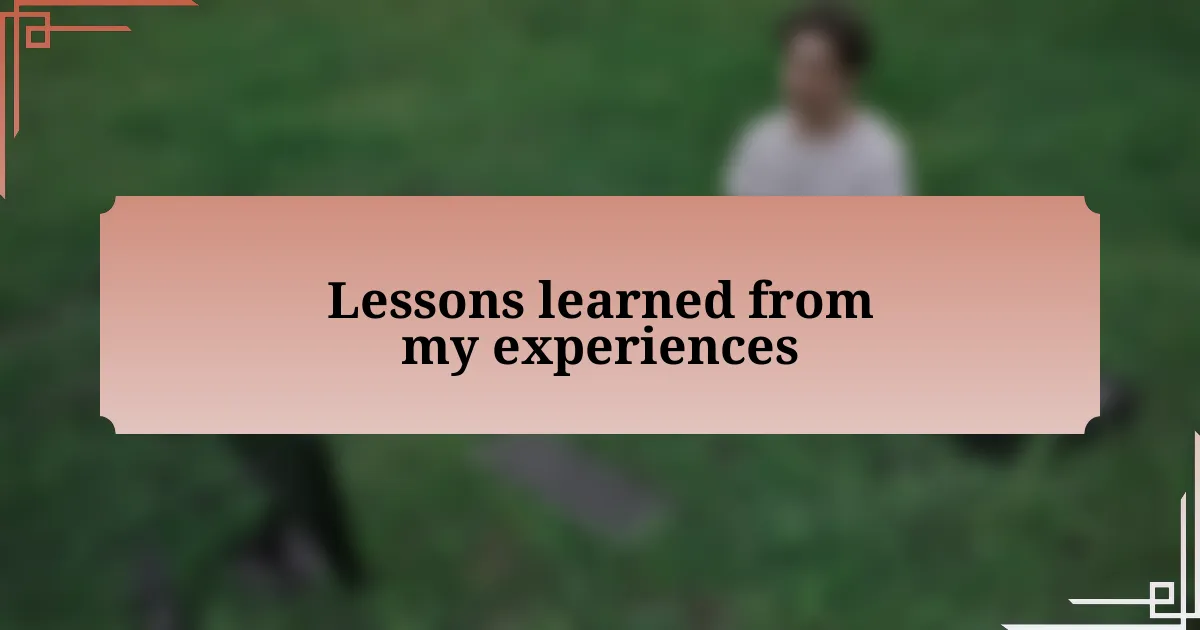
Lessons learned from my experiences
Throughout my journey in tournament preparation, I learned that persistence can be your greatest ally. I remember days where mistakes felt insurmountable, especially when practicing combos that refused to gel. It was during those frustrating moments that I developed a tenacity I didn’t know I had, the kind that whispered, “Keep going, you’ll get there.” Have you ever pushed through a barrier that felt impossible? That’s when true growth occurs.
I also realized how vital mental fortitude is when competing at higher levels. There was an intense match where a single misstep cost us the game. In that moment, I felt the weight of disappointment settle in, but instead of wallowing in it, I chose to analyze what went wrong. This mindset helped me transform setbacks into strategies for future plays. How does reflection shape your path to improvement?
Finally, I discovered the power of teamwork, which often extends beyond just playing the game. During a particularly heated tournament, establishing clear communication not only improved performance but also solidified friendships. The bonds we built helped us maintain morale through tough matches. It’s fascinating how fostering camaraderie can enhance not just gameplay but also the overall tournament experience, isn’t it?
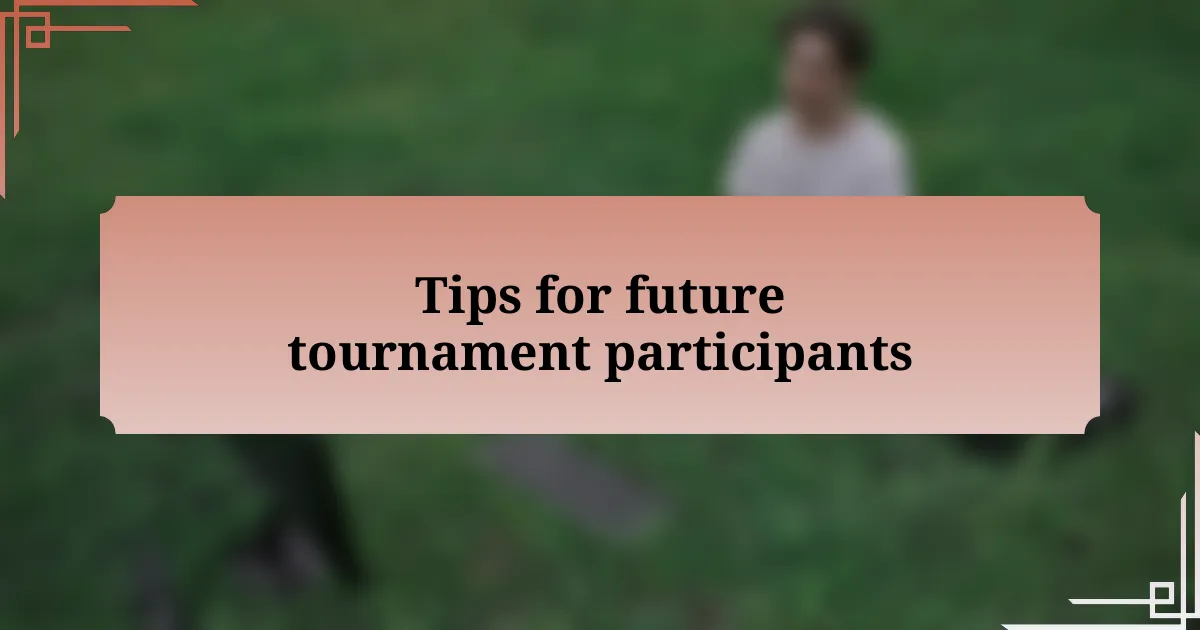
Tips for future tournament participants
When preparing for a tournament, I’ve found that practicing under realistic conditions is crucial. I remember one time, I took the initiative to set up match simulations that mimicked the actual tournament setup – same rules, same pressure. The anxiety I felt in those moments became a great teacher, allowing me to manage my nerves better when it truly mattered. Have you ever experienced a moment where simulated pressure helped you perform better?
Another invaluable tip is to prioritize your health. During my first big tournament, I was so focused on practice that I neglected sleep and nutrition. I vividly recall feeling fatigued and unfocused during crucial matches because I hadn’t fueled my body properly. Taking care of your physical well-being can profoundly impact your mental sharpness. What strategies are you using to maintain your health as a competitor?
Lastly, don’t underestimate the power of analyzing your opponents. I’ve spent countless hours studying gameplay footage, not just of pros but also of players I would face in my tournaments. It felt like unearthing a treasure trove of strategies. By understanding their patterns and tendencies, I was able to devise plans tailored to counter their strengths. How often do you take the time to study your competition?

